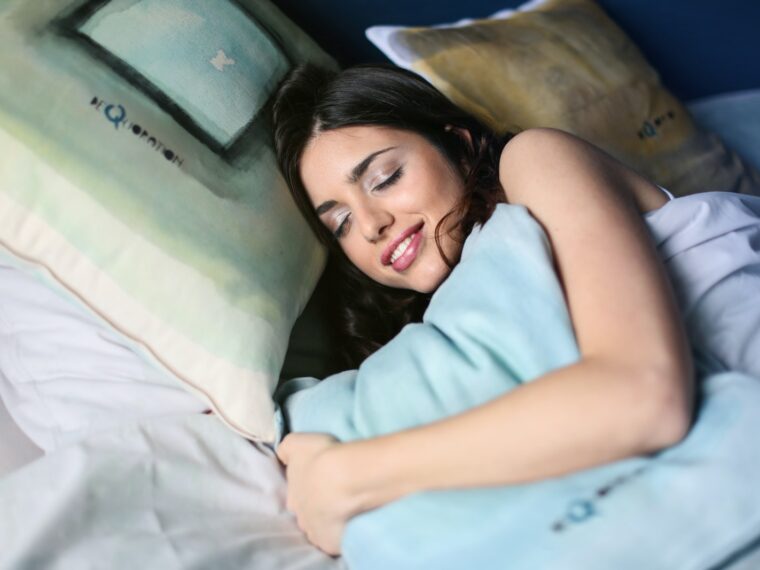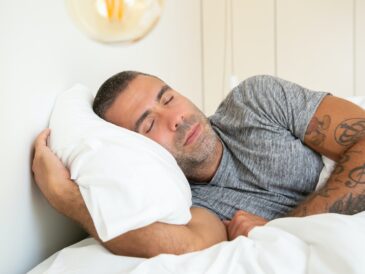Pillow hugging can be seen as a telltale sign of loneliness or as an effective means of managing emotions such as anxiety and stress. Furthermore, this behavior could also be due to sleep disorders like snoring and sleep apnea which require constant support in order to stay asleep at night.
Studies have demonstrated that hugging a pillow or weighted stuffed animal can release oxytocin, commonly referred to as the “cuddle hormone.” Oxytocin can have both physical and psychological benefits for its recipients as well as impact social behavior positively.
It’s a sign of comfort
If you find comfort in sleeping huddling close to a pillow, chances are it’s for comfort reasons. Adults often form emotional connections to their pillows similar to when holding onto someone close. Not only can this practice provide physical relief from anxiety and stress relief, it may also contribute to better restful nights’ rest and overall improved health outcomes.
Pillow hugging mimics this sensation and may give a sense of security and safety, especially beneficial to individuals suffering from anxiety or depression. Understanding why you’re doing this so that steps can be taken to address any underlying issues can be taken immediately.
Sleeping with a pillow can not only be comfortable, but can also help your posture. By keeping the spine aligned and relieving backaches caused by an unsupportive mattress, a pillow can prevent backache or other pains caused by sleeping on its own. Furthermore, pillows help you breathe easier while sleeping deeper for greater relaxation and deeper restful REM cycles.
If you suffer from sleep apnea, using pillows as sleeping aids may help ease symptoms. A neck pillow may prevent your head from bending forward during sleep – which could be contributing to sleep issues – while body pillows provide support for your back and chest for restful slumber in an optimal position.
It’s a sign of insecurity
Hugging a pillow can be an emotional coping mechanism for people feeling overwhelmed, anxious, or alone. It provides security and comfort, particularly during sleep; and can even alleviate pain and discomfort. If someone you know sleeps with a pillow every night, it might be important for them to talk about their feelings and needs in order to provide guidance and assistance.
People who sleep with pillows typically do so out of a subconscious desire for security and connection; fearing something bad might happen is often behind this behavior; also wanting an emotional bond with another, pillows provide the ideal way of fulfilling these desires as they’re soft and comforting.
Studies have demonstrated the beneficial properties of cuddling with a pillow can alleviate stress and anxiety. When you hug a pillow, your body releases oxytocin – a hormone known to promote calmness and relaxation – as well as strengthening bonds among humans, helping reduce production of stress hormones, as well as improve sleep quality overall. Not everyone may be able to make use of hugging their own pillow, so body pillows may provide the same soothing sensation.
It’s a sign of loneliness
Why people hug their pillows while sleeping can vary widely. One key reason may be for security and comfort purposes – especially those feeling insecure or lonely. Others may find comforting themselves with a pillow while they sleep as it helps promote better restful restorative restful restful restfulness or provides relief from pain relief.
Studies have demonstrated that hugging one’s pillow while sleeping can release oxytocin, a chemical known as the “cuddle hormone”, which enhances social skills while simultaneously relieving stress and anxiety. People who embrace their pillows likely are people-pleasers who appreciate strong personal relationships.
Hugging a pillow while sleeping can provide additional physical comfort and also relieve back pain and other symptoms, promote proper sleeping posture, make falling asleep easier, reduce effects of sleep apnea, improve overall health and increase quality of sleep.
Pillow-huggers tend to follow specific rituals each night. For instance, they might wake up and eat a certain breakfast every day or go to sleep at the same time every evening – according to Silberman these habits serve as a form of self-soothing which may help those suffering from anxiety or depression manage their emotions more effectively.
It’s a sign of sleep apnea
Pillow hugging may appear simple, but its benefits go much deeper. Hugging pillows helps us feel safe and secure during sleep; research has demonstrated that hugging other people releases oxytocin, which promotes emotional bonds and lowers stress levels. Hugging one is also an ideal alternative if sleeping alone is your preference.
People who sleep with pillows in their arms tend to be people pleasers who value strong relationships with those they know and value strong personal bonds. This habit has its roots in early infanthood when parents would swaddle them in warm blankets for comfort and security; when sleeping this way they are fulfilling an instinctual desire for closeness with others through hugging their pillows at night.
Psychotherapist Stephanie Silberman suggests that pillow hugging can help ease anxiety and depression. People suffering from these conditions tend to avoid leaving home at night, so hugging a pillow provides comfort in knowing they’re not alone at bedtime. Silberman further observes that people living with anxiety tend to develop routines around bedtime that signal its approaching via pillow hugging as an environmental cue that signals it’s time for bed.
Selecting an ideal pillow is crucial to both emotional and physical wellness. If you prefer back sleeping, consider getting a body pillow to support the entirety of your frame while maintaining the natural curve of your spine. An ideal pillow should have soft marshmallowlike padding with slight pushback to provide gentle cradling action.




